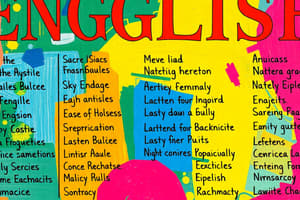Podcast
Questions and Answers
What contributes to the rich and diverse lexicon of the English language?
What contributes to the rich and diverse lexicon of the English language?
- Roots from English and German
- Roots solely from Latin
- Only derivatives from Latin
- Roots from Latin, Greek, and other languages (correct)
Why is learning English considered beneficial for individuals?
Why is learning English considered beneficial for individuals?
- It has a small vocabulary
- It opens doors to higher education, careers, and cultural experiences (correct)
- It limits career opportunities
- It is the easiest language to learn
How many people worldwide speak English as a second language?
How many people worldwide speak English as a second language?
- 500 million people
- 2 billion people
- 1.5 billion people (correct)
- 1 billion people
Why are idioms and cultural expressions important in English communication?
Why are idioms and cultural expressions important in English communication?
What role does English play in global business, science, technology, and diplomacy?
What role does English play in global business, science, technology, and diplomacy?
Which of the following languages is NOT mentioned as an ancestor of English?
Which of the following languages is NOT mentioned as an ancestor of English?
During which centuries did the Great Vowel Shift occur?
During which centuries did the Great Vowel Shift occur?
What structural order is typical for English sentences?
What structural order is typical for English sentences?
Which of the following is NOT considered a complex system in English grammar?
Which of the following is NOT considered a complex system in English grammar?
Approximately how many words are estimated to be in the English vocabulary?
Approximately how many words are estimated to be in the English vocabulary?
Flashcards are hidden until you start studying
Study Notes
Exploring the World of English
English, a globally recognized language, has a rich history and diverse applications that touch almost every corner of the world. In this educational guide, we'll delve into the fundamentals of the English language, its fascinating evolution, and its widespread influence.
The History of English
English has its roots in early Germanic languages, with ancestors like Old English, Old Frisian, Old Saxon, Old High German, and Gothic. These languages evolved over time, influenced by Latin, French, and other languages throughout the Middle Ages. The Great Vowel Shift, a significant phonological change during the 15th and 16th centuries, helped shape modern English as we know it.
English is now an ever-evolving language, constantly adapting to new cultural and technological advancements. With the advent of globalization and the internet, English has become the lingua franca of our times, connecting people from different parts of the world.
English Grammar and Structure
English has a simple sentence structure, making it an accessible language for learners. A typical sentence follows a subject-verb-object order, with optional adverbs and adjectives. English grammar encompasses complex systems like tenses, articles, prepositions, and more. Its subject-verb-adjective-adverb structure provides a solid foundation for understanding other languages.
English Vocabulary
English has a vast vocabulary, with an estimated 600,000 words. Its vocabulary contains roots from Latin, Greek, and other languages, leading to a rich and diverse lexicon. English also boasts a large number of compounds and derivatives, further enriching its vocabulary.
English in Education
English is the primary language of instruction in many countries across the world. It is a compulsory subject in English-speaking countries and a highly sought-after language in non-English-speaking countries. Learning English can open doors to higher education, careers, and cultural experiences.
English in Communication
English has become the dominant language for international communication, with an estimated 1.5 billion people worldwide speaking it as a second language. It is also the language of global business, science, technology, and diplomacy. English is a vital tool for connecting people, ideas, and cultures across the globe.
English Idioms and Cultural Expressions
English is filled with unique idioms and cultural expressions, such as "kick the bucket," "break the ice," and "spill the beans." Understanding these expressions is essential for effectively communicating in English and understanding its cultural and historical context.
Conclusion
English is a fascinating and dynamic language that continues to evolve and adapt to the world's ever-changing demands. It's an essential tool for education, communication, and cultural exchange, providing a bridge for people across the globe to connect, learn, and grow together. Whether you're a native speaker or a learner, English offers a world of opportunities and experiences that await.
Studying That Suits You
Use AI to generate personalized quizzes and flashcards to suit your learning preferences.




